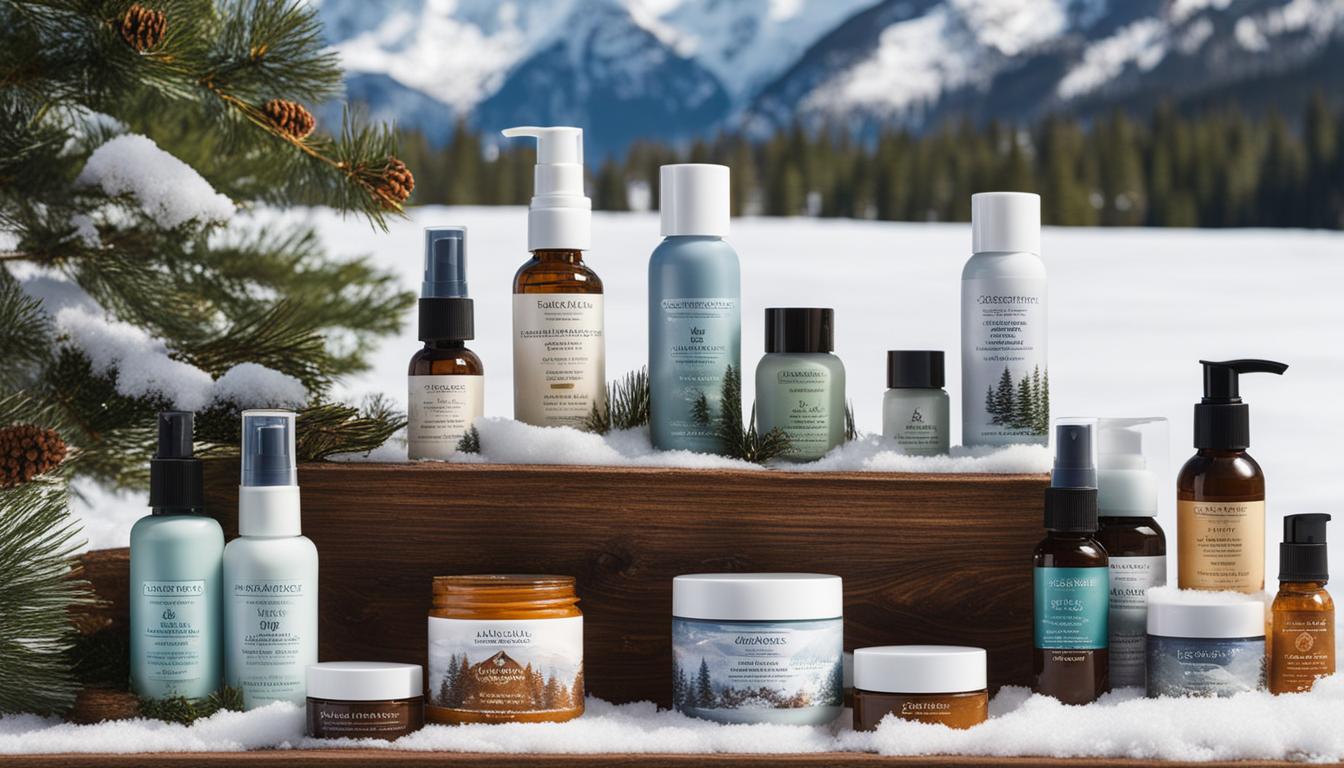During the winter season, the cold weather and low humidity can have a negative impact on the skin, leaving it dry and dull. It’s important to adapt your skincare routine to combat these effects and maintain a glowing complexion. Implementing the right skincare tips can help keep your skin hydrated and radiant despite the chill.
Key Takeaways:
- Adjust your skincare routine to combat the dryness and dullness caused by cold weather.
- Keep your skin hydrated and nourished to maintain a glowing complexion.
- Incorporate gentle cleansing, hydration, protection, and nourishment into your winter skincare routine.
- Choose skincare products formulated for intense hydration, nourishment, and protection.
- Consider using homemade remedies with natural ingredients to address winter skin issues.
Understanding the Impact of Cold Weather on the Skin
In winter, the skin faces numerous challenges due to the drop in temperature, harsh winds, and low humidity levels. These conditions can have a significant impact on the skin, resulting in moisture loss and dry, flaky skin. The effects are further exacerbated by indoor heating, which depletes the air of moisture, leaving the skin parched and vulnerable.
The cold weather can disrupt the skin’s natural barrier function, leading to increased transepidermal water loss and a compromised protective layer. This makes the skin more susceptible to dehydration, redness, sensitivity, and irritation.
Low humidity levels in winter cause the air to become dry, contributing to the moisture loss in the skin. As a result, the skin’s natural hydration levels decrease, leading to a dull, lackluster complexion.
Understanding how cold weather affects the skin is essential in developing a skincare routine that effectively addresses these specific challenges. By adopting targeted measures, you can help maintain the skin’s health and nourishment, even in the harshest winter conditions.
Here are some key impacts of cold weather on the skin:
- Dryness and moisture loss: Winter weather zaps moisture from the skin, resulting in dry and dehydrated skin.
- Flaky and dull skin tone: The lack of moisture and exfoliation during winter can cause buildup of dead skin cells, leading to a dull complexion.
- Sensitivity and redness: Cold winds and low humidity can leave the skin more prone to irritation and sensitivity.

Cold weather impacts the skin in various ways, and it’s crucial to adapt your skincare routine to counter these effects. The next section will focus on the importance of a winter skincare routine to help you achieve and maintain a healthy and glowing complexion throughout the season.
Importance of Winter Skincare Routine
Maintaining a consistent skincare routine is crucial during the winter months when the skin is more prone to dryness and sensitivity. A well-crafted winter skincare regimen replenishes lost moisture, soothes irritation, and fortifies the skin’s natural defenses against harsh environmental factors. Incorporating gentle cleansing, hydration, protection, and nourishment is essential for a healthy and glowing complexion.
Gentle Cleansing
During winter, it’s essential to use a gentle cleanser that effectively removes impurities without stripping the skin’s natural oils. Opt for a pH-balanced cleanser that doesn’t disrupt the skin’s moisture barrier. Avoid hot water and harsh exfoliants that can further dehydrate the skin.
Hydration
Keeping your skin hydrated is crucial for maintaining its health and vibrancy during winter. Use a moisturizer with hyaluronic acid or ceramides to lock in moisture and prevent dryness. Consider incorporating a hydrating serum or facial oil to provide an extra layer of nourishment to your skin.
Protection
Protecting your skin from harsh winter elements is key to preventing moisture loss and damage. Apply a broad-spectrum sunscreen with at least SPF 30 every day, even on cloudy days, to shield your skin from harmful UV rays. Additionally, wearing protective clothing like scarves and gloves can help prevent windburn and maintain your skin’s moisture barrier.
Nourishment
Supplying your skin with vital nutrients is essential for a healthy and radiant complexion. Include antioxidant-rich foods in your diet, such as berries, leafy greens, and nuts, to help combat oxidative stress and promote skin cell regeneration. Additionally, consider incorporating skincare products with ingredients like vitamin C and niacinamide to further nourish and brighten your skin.

Essential Steps in a Winter Skincare Routine
| Step | Description |
|---|---|
| Cleansing | Gently cleanse the skin using a pH-balanced cleanser to remove impurities without drying it out. |
| Exfoliation | Exfoliate once or twice a week to remove dead skin cells and promote cell turnover. Use a gentle exfoliant suitable for your skin type. |
| Hydration | Apply a moisturizer with hyaluronic acid or ceramides to hydrate and protect the skin from moisture loss. |
| Protection | Apply a broad-spectrum sunscreen with at least SPF 30 daily to protect the skin from harmful UV rays. |
| Nourishment | Incorporate antioxidant-rich foods in your diet and use skincare products with skin-nourishing ingredients like vitamin C and niacinamide. |
A well-rounded winter skincare routine ensures that your skin stays moisturized, protected, and nourished despite the cold weather. By following these essential steps, you can maintain a healthy and glowing complexion all winter long.
Essential Winter Skincare Tips for a Glowing Complexion
To achieve a glowing complexion during winter, it’s important to prioritize hydration, moisturizing skincare, and winter skincare essentials. By following these tips, you can keep your skin healthy, nourished, and radiant throughout the cold season.
1. Stay Hydrated
Hydration is key to maintaining healthy skin, even in the winter. Make sure to drink plenty of water throughout the day to keep your skin hydrated from within. Hydrated skin is less prone to dryness, and it helps to maintain a natural glow.
2. Use a Nourishing Moisturizer
Invest in a high-quality moisturizer that is specially formulated for winter skincare. Look for moisturizers with hydrating ingredients like hyaluronic acid, glycerin, and ceramides. These ingredients help to lock in moisture and nourish the skin, preventing dryness and flakiness.
3. Protect Your Skin with SPF
Even in winter, it’s important to protect your skin from harmful UV rays. Apply a broad-spectrum sunscreen with at least SPF 30 before going outside, especially if you’ll be participating in winter activities or spending extended periods of time outdoors.
4. Invest in a Humidifier
Combat indoor dryness by using a humidifier in your home. Heating systems can strip the air of moisture, leading to dry and dehydrated skin. A humidifier adds moisture back into the air, helping to prevent dryness and irritation.
5. Nourish Your Skin with Antioxidants
Antioxidants play a crucial role in protecting the skin from environmental damage and maintaining a healthy complexion. Incorporate skincare products that contain antioxidant-rich ingredients like vitamin C, green tea extract, or resveratrol. These ingredients help to fight free radicals and promote a radiant skin tone.
By following these winter skincare tips, you can effectively hydrate your skin, nourish it with essential moisture, shield it from UV damage, and provide it with the necessary nutrients for a glowing complexion.
| Hydration in Winter | Moisturizing Skincare Tips | Winter Skincare Essentials |
|---|---|---|
| Stay hydrated by drinking plenty of water. | Use a nourishing moisturizer with hydrating ingredients. | Protect your skin with SPF and invest in a humidifier. |
| Incorporate antioxidant-rich skincare products. |
Choosing the Right Skincare Products for Winter
When it comes to winter skincare, selecting the right products is essential for maintaining a hydrated and protected complexion. The cold weather and low humidity levels can cause dryness and sensitivity, making it crucial to choose formulations that offer intense moisturization, nourishment, and defense against external aggressors.
Moisturizers for Winter
One of the key skincare products for the winter season is a moisturizer that provides deep hydration and helps to lock in moisture. Look for moisturizers with rich textures and occlusive ingredients that create a barrier on the skin, preventing water loss. These ingredients can include shea butter, ceramides, or hyaluronic acid.
Here is a table showcasing some moisturizers suitable for winter:
| Product | Main Ingredients |
|---|---|
| Brand X Hydrating Cream | Shea Butter, Hyaluronic Acid |
| Brand Y Nourishing Balm | Ceramides, Squalane |
| Brand Z Deep Moisturizer | Jojoba Oil, Glycerin |
Ingredients for Winter Skincare
In addition to moisturizers, incorporating certain ingredients can further enhance your winter skincare routine. These ingredients provide additional hydration, protection, and nourishment to the skin, keeping it healthy and glowing.
- Vitamin C: Known for its brightening properties, vitamin C helps to stimulate collagen production and improve the skin’s texture.
- Niacinamide: This ingredient helps to strengthen the skin’s barrier function, reduce redness, and minimize the appearance of pores.
By selecting products that contain these ingredients, you can target specific skin concerns and ensure optimal results during the winter months.
Remember, it’s also important to choose gentle, fragrance-free cleansers that effectively remove impurities without stripping the skin’s natural oils. This helps to maintain a healthy skin barrier and prevent further dryness and irritation.

Visually appealing and relevant to the topic of winter skincare products, the image above showcases a variety of moisturizers perfect for the cold season.
Choosing the right skincare products for winter is crucial for maintaining a healthy and radiant complexion. Look for moisturizers that provide intense hydration, and don’t forget to incorporate ingredients like vitamin C and niacinamide for added benefits. With the right products, you can keep your skin nourished, protected, and glowing all winter long.
DIY Home Remedies for Winter Skincare
In addition to commercial skincare products, you can also create DIY remedies using natural ingredients to cater to your skin’s needs during winter. Homemade face masks, exfoliants, and moisturizing treatments provide targeted care and nourishment. Ingredients like honey, yogurt, coconut oil, sugar, oats, aloe vera, and avocado offer hydration, gentle exfoliation, and soothing properties for combating winter skin issues.
To address dry skin, try a moisturizing face mask with mashed avocado mixed with a tablespoon of honey. Apply the mixture to your face, leave it on for 15 minutes, and then rinse off with warm water. Avocado is rich in healthy fats that nourish and hydrate the skin, while honey provides moisture and antioxidants.
“Avocado is rich in healthy fats that nourish and hydrate the skin, while honey provides moisture and antioxidants.”
For gentle exfoliation, create a sugar scrub by mixing granulated sugar with your choice of oil (such as coconut or olive oil). Gently massage the scrub onto your face in circular motions for 1-2 minutes, then rinse off with warm water. The sugar helps slough off dead skin cells, revealing a smoother complexion, while the oil provides hydration and a protective barrier.

To soothe irritated skin, you can make a nourishing oat and yogurt mask. Combine plain yogurt with ground oats to form a paste, then apply it to your face. Leave it on for 10-15 minutes before rinsing off. Oats help calm inflammation and provide gentle exfoliation, while yogurt moisturizes and restores the skin’s natural pH balance.
DIY Winter Skincare Recipes:
| DIY Recipe | Ingredients | Benefits |
|---|---|---|
| Avocado and Honey Face Mask | 1 ripe avocado, 1 tbsp honey | Hydrates, nourishes, and provides antioxidants |
| Sugar Scrub | Granulated sugar, oil of choice (e.g., coconut, olive) | Exfoliates gently and hydrates |
| Oat and Yogurt Mask | Plain yogurt, ground oats | Calms inflammation and restores pH balance |
These DIY remedies offer a natural and affordable way to combat dry skin, provide hydration, and enhance your winter skincare routine. Experiment with different combinations and ingredients to find the ones that work best for your skin type and concerns. Remember to patch test before applying anything to your face and discontinue use if you experience any adverse reactions.
Protecting Your Skin from Harsh Winter Elements
Winter weather can be tough on your skin, causing dryness and sensitivity. It’s crucial to take proactive steps to protect your skin from the harsh winter elements. By following these tips, you can maintain your skin’s health and hydration even in the coldest weather.
Invest in Protective Accessories
One of the simplest ways to shield your skin from the winter elements is to wear protective accessories like scarves and gloves. These items create a barrier between your skin and the cold air, preventing moisture loss and reducing the risk of chapping or irritation.
Use a Physical Barrier Cream or Balm
For exposed areas like your face and hands, applying a physical barrier cream or balm can provide an additional layer of protection. Look for products that contain ingredients like beeswax or occlusive oils, which form a protective barrier against wind and cold.
Avoid Prolonged Exposure
Try to limit your exposure to harsh winter elements, particularly during extremely cold or windy days. If you must be outside for an extended period, take frequent breaks to warm up indoors and protect your skin from excessive cold or wind exposure.
Moisturize Regularly
Winter skincare protection goes beyond external measures. Keep your skin nourished and hydrated by regularly moisturizing with a rich, emollient moisturizer. Look for products that contain hydrating ingredients such as hyaluronic acid or ceramides to help replenish moisture and maintain your skin’s barrier function.
Protect Your Lips
Don’t forget to protect your lips, which are prone to dryness and chapping during winter. Apply a moisturizing lip balm with SPF to keep your lips hydrated and shielded from the sun’s harmful UV rays, which can still cause damage even on overcast winter days.
“Investing in protective accessories, using a physical barrier cream, and avoiding prolonged exposure are simple yet effective ways to shield your skin from the harsh elements of winter.”
By incorporating these protective measures into your winter skincare routine, you can safeguard your skin from the damaging effects of cold weather. Remember, prevention is key in maintaining healthy, hydrated skin throughout the winter season.
Hydration and Nutrition for Healthy Winter Skin
In addition to external skincare, maintaining proper hydration and nutrition is crucial for achieving and maintaining healthy winter skin. Your diet plays a significant role in determining the overall health and appearance of your skin. By incorporating hydrating foods and essential nutrients, you can nourish your skin from the inside out and promote a radiant complexion even during the coldest months of the year.
Hydration for Skin
Staying hydrated is essential for healthy skin, regardless of the season. During winter, when the air is dry and the skin is more prone to dehydration, it becomes even more important to drink an adequate amount of water throughout the day. In addition to water, consuming foods with high water content can contribute to overall skin hydration. Fruits such as watermelon, oranges, and grapefruits, as well as vegetables like cucumber and lettuce, are excellent choices to incorporate into your winter diet. These hydrating foods help replenish water loss and improve the appearance of your skin.
Winter Skincare Nutrition
A balanced diet that includes essential nutrients is crucial for maintaining healthy skin during winter. Certain foods and nutrients offer specific benefits for the skin, helping to combat dryness and promote a glowing complexion. Here are some key nutrients to focus on:
- Omega-3 fatty acids: Found in fatty fish such as salmon, mackerel, and sardines, as well as chia seeds and walnuts, omega-3 fatty acids help strengthen the skin barrier, reduce inflammation, and retain moisture.
- Vitamin D: With limited exposure to sunlight during winter, it’s important to ensure adequate vitamin D intake. Foods like fortified dairy products, egg yolks, and fatty fish are good sources of vitamin D, which supports skin health and overall well-being.
- Antioxidants: Incorporating antioxidant-rich foods like berries, dark leafy greens, and green tea can help protect your skin from oxidative stress caused by harsh winter conditions. Antioxidants neutralize free radicals, which can lead to premature aging and other skin concerns.
In addition to these specific nutrients, maintaining a well-rounded diet that includes a variety of fruits, vegetables, whole grains, lean proteins, and healthy fats can provide the essential vitamins and minerals necessary for optimal skin health.
“Eating a diet rich in antioxidants, omega-3 fatty acids, and other essential nutrients can support your skin’s health and resilience, enabling it to withstand the challenges of winter.”
| Food | Benefit |
|---|---|
| Salmon | Provides omega-3 fatty acids that support skin hydration and reduce inflammation. |
| Oranges | High in vitamin C, which promotes collagen production and protects the skin against environmental damage. |
| Avocado | Rich in healthy fats and vitamin E, which nourish and moisturize the skin. |
| Spinach | Packed with antioxidants and vitamins A and C, which help repair and strengthen the skin. |
| Walnuts | Contain omega-3 fatty acids and antioxidants that support skin health and combat inflammation. |
By incorporating these foods into your winter diet, you can provide your skin with the necessary hydration and nutrition it needs to stay healthy and radiant. Remember to consult with a healthcare professional or registered dietitian if you have any specific dietary concerns or restrictions.
Conclusion
Navigating the challenges of winter skincare doesn’t have to be daunting. With a comprehensive understanding of how cold weather affects the skin and the implementation of targeted skincare practices, you can maintain a glowing complexion all season long. By prioritizing hydration, selecting the right products, and protecting your skin from harsh elements, you can optimize your winter skincare routine.
Remember to focus on both external and internal hydration. While nourishing your skin with moisturizers and creams is essential, consuming hydrating foods and staying well-hydrated throughout the day is equally important. This holistic approach will help your skin thrive even in the coldest climates.
As winter approaches, take proactive steps to adapt your skincare routine. Choose products that provide intense hydration and protection, and consider incorporating natural remedies for targeted care. By embracing these tips, you can confidently face the cold weather with a radiant and resilient complexion. Your skin will thank you for the extra care and attention, and you’ll enjoy a healthy glow throughout the winter season.
FAQ
How does cold weather affect the skin?
During winter, the drop in temperature, harsh winds, and low humidity levels can lead to moisture loss and dry, flaky skin. Indoor heating further depletes the air of moisture, resulting in parched and vulnerable skin.
Why is a winter skincare routine important?
Maintaining a consistent skincare routine in winter is crucial as the skin is more prone to dryness and sensitivity. A well-crafted winter skincare regimen replenishes lost moisture, soothes irritation, and fortifies the skin’s natural defenses against harsh environmental factors.
What are essential winter skincare tips for a glowing complexion?
To achieve a glowing complexion during winter, it’s important to stay hydrated, use a nourishing moisturizer, protect the skin with SPF, invest in a humidifier to combat indoor dryness, and nourish the skin with antioxidants.
How do I choose the right skincare products for winter?
When selecting skincare products for winter, look for formulations that offer intense hydration, nourishment, and protection. Moisturizers with rich textures and occlusive ingredients help lock in moisture and protect the skin. Gentle, fragrance-free cleansers effectively remove impurities without stripping the skin’s natural oils.
Are there any DIY home remedies for winter skincare?
Yes, you can create homemade face masks, exfoliants, and moisturizing treatments using natural ingredients like honey, yogurt, coconut oil, sugar, oats, aloe vera, and avocado. These DIY remedies offer hydration, gentle exfoliation, and soothing properties for combating winter skin issues.
How can I protect my skin from harsh winter elements?
To protect your skin, invest in protective clothing like scarves and gloves, use a physical barrier cream or balm on exposed areas, and avoid prolonged exposure to harsh elements. These measures create a protective layer and prevent moisture loss and irritation.
How can hydration and nutrition contribute to healthy winter skin?
Hydrating from within is as important as external skincare during winter. Consuming hydrating foods, such as fruits and vegetables with high water content, can contribute to overall skin hydration. Incorporating foods rich in omega-3 fatty acids and supplements like fish oil or vitamin D supports skin function and promotes a healthy glow.


